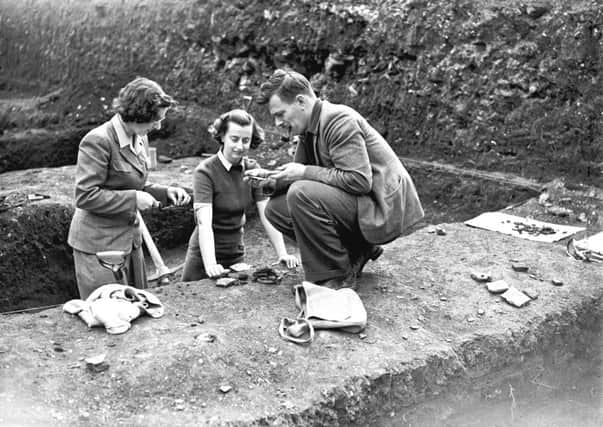Obituary: Professor Sheppard Frere CBE


Sheppard Frere was instrumental in excavating many of the most important Roman sites in Britain – principally at Verulamium, the Roman city along Watling Street in modern-day St Albans. He was an assiduous collator of information after a dig and his analysis of the artefacts was done with meticulous care. Such was his insistence on researching the finds at Verulamium in detail that his definitive account of the dig did not appear for 11 years (in 1972). Two further comprehensive volumes followed.
His work in Scotland was vital in confirming Roman habitation as far north as Strageath near Crieff. Originally built at the end of the first century, the settlement at Strageath was one of a line of fortifications built by the Romans around the Gask Ridge in Perthshire.
Advertisement
Hide AdAdvertisement
Hide AdThe forts were created to control the central part of the river Earn valley and access to the Highlands via Loch Earn and the Sma’ Glen. This frontier system is the earliest Roman land frontier in Britain, built 50 years before Hadrian’s Wall. Strageath was abandoned, but later re-occupied and Frere’s work acknowledged its significance.
Frere carried out exhaustive research on the sight from 1973 and confirmed that the defences had been occupied over a number of years. He also established that there had been a temporary Roman camp at Strageath, another at nearby Dornock Cottage and two at Innerpeffray.
Frere wrote extensively about his work in Perthshire (Strageath: Excavations within a Roman Fort 1973–86) and returned often in the 1980s to continue his investigations. In 1983 he joined Professor JJ Wilkes on assessing fresh finds.
Frere wrote then that “excavations at Strageath between 1973 and 1986 indicated three successive phases of military occupation with a complete remodelling of the defences on each re-occupation. A recent assessment of the Roman occupation of Scotland suggests a single 2nd-century occupation: while the weight of excavated evidence from Strageath indicates two distinct phases of occupation.”
Frere verified that the finds were historically noteworthy. “Pottery dating from the earlier half of the 1st millennium BC and possibly also from the 3rd millennium BC were recovered, together with a collection of undiagnostic flints.” Many of these finds are now in the National Museum of Antiquities of Scotland or the Hunterian Museum.
The archaeological surveys of the Strageath area have continued since Frere’s work. There have been many finds which have confirmed his detailed conclusions and in 2008 a geophysical survey showed there was funereal and industrial activity in the area. “Two heavy square flags may represent altar bases,” a report suggested. Frere’s foresight in excavating at Strageath and his scholarly conclusions have been amply rewarded over the years.
Sheppard Sunderland Frere – known affectionately by colleagues and friends as Sam – was the son of a colonial civil servant. Frere attended Lancing College and then read classics at Magdalene College, Cambridge. After graduating in 1938 he taught at Epsom College and then Lancing. During the war he served with the Auxiliary Fire Service. In the 1950s – while teaching classics and as a housemaster at Lancing – he excavated in the heavily bombed streets of Canterbury.
From 1955–61 Frere was in charge of the diggings at Verulamium – one of the central areas for Roman occupation in the south and of enormous historic significance.
Advertisement
Hide AdAdvertisement
Hide AdHis discoveries led to a substantial reassessment of previously held opinions about the Roman occupation. The care he took has ensured that the splendid mosaics that were unearthed are still to be seen in the local museum and in excellent condition.
In 1961 Frere was appointed Professor of the Archaeology of the Roman Provinces at London University and from 1966 held a similar post as a Fellow of All Souls at Oxford University. He wrote widely in academic magazines and his acclaimed book – Britannia: History of Roman Britain – provides a detailed analysis of the archaeology of Roman Britain including incisive arguments on why the Romans did not conquer the whole of Scotland.
Large in body with an encyclopedic knowledge of Roman history, he delighted in being a character – invariably driving to all his digs in a vintage Rolls-Royce puffing on his ever-present pipe. On the day after the Great Train Robbery in 1963, Frere was driving to a dig in Oxfordshire when he was stopped by the police. A local had reported seeing a large car, travelling at some speed with “four rough-looking men” inside.
Frere, who was awarded the CBE in 1976, remained a passionate gardener all his life. He married Janet Hoare while he was a housemaster at Lancing and she and their son and daughter survive him.